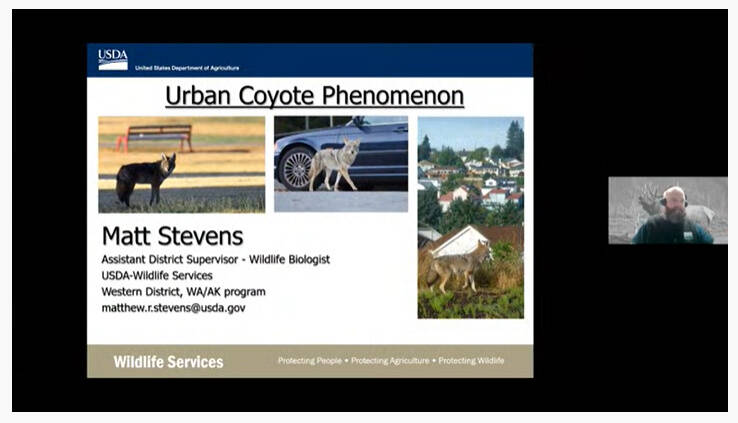With increased coyote sightings on Mercer Island over the past few months, along with reports rolling in from concerned residents, the city contacted expert Matt Stevens to assess coyote activity and behavior on the Island.
In a virtual presentation open to the public on Nov. 15, Stevens — assistant district supervisor and urban coyote coordinator for the United States Department of Agriculture (USDA) Wildlife Services Western District — revealed his findings and insight after he and a coworker spoke with residents and perused entries on social media regarding the urban coyote phenomenon. More than 70 people attended the meeting.
“People are seeing them and hearing them at night and occasionally seeing one cross the road. A cat maybe went missing or people even saw them maybe run across the road with their cat,” said Stevens, adding that a multitude of sightings took place in Luther Burbank Park and Pioneer Park.
Stevens’ top recommendation is for people to bring their pets inside, especially because they know coyotes are present. On the Island, he also found that coyotes are rarely seen, but are heard at night.
Digging into his assessment, he believes there’s at least two — possibly four — coyotes roaming the Island. He added that a coyote — the second fastest land mammal in North America at 40 mph — can cover one end of the Island three times in one evening.
“My formal recommendation to the city was to, until something drastically changes, there’s no threat here to human health and safety,” he said. “Nobody has experienced anything that would lead me to believe that these coyotes are going to attack somebody.”
Through his research, Stevens has found that coyote sightings are unique to the Island and there has been little to no local activity until recently. Presently, the USDA would not be inclined to remove any animals from the Island, said Stevens, adding that if coyote behavior were to escalate, his recommendation to the city could change. He doesn’t know how long the coyotes will stay, and he believes they arrived via the highway.
“We intend to continue to communicate with him for support as the situation continues with the coyotes,” said City Manager Jessi Bon during her report at the Nov. 16 city council meeting. According to Mercer Island Police Department operations commander Mike Seifert at the presentation, the cost of the assessment amounted to $1,100 ($55 an hour for 20 hours).
Other pertinent information that Stevens relayed to residents at the meeting was that coyotes are not common rabies carriers; they charge pets — not people — because they believe them to be intruders; they can be scared away by air horns, paintball guns and whistles; they are attracted to food scraps in compost and fruit and berries dropped from trees; and fallen seeds from bird feeders can attract rodents and in turn bring predators, including coyotes, to the scene.


